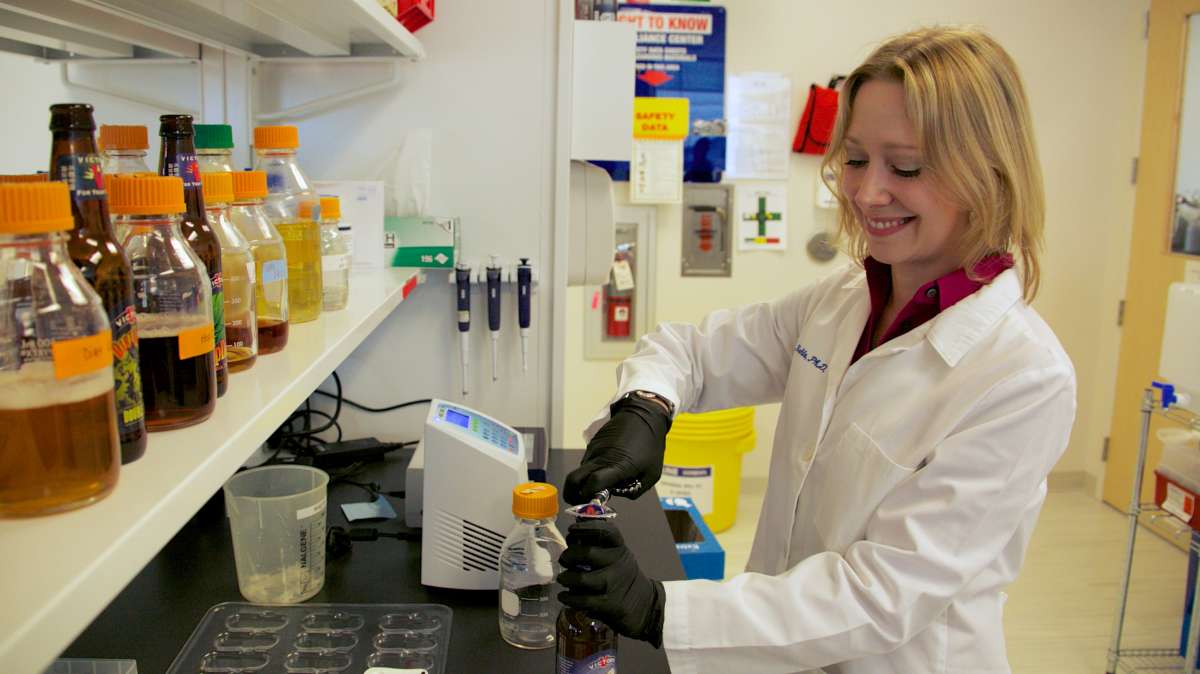How science saved beer
Listen-

-

-

-

-

-

-

-

-

-

-

Kristen Kahle
-

-

If it weren’t for our understanding of the chemical process that creates our favorite beers, we’d still be drinking spoiled ale like our forefathers.
Turkey, stuffing and pumpkin pie are, without question, classic components of a Thanksgiving Day meal. Still, more than a few people are thankful that beer is just as soaked with tradition; especially when it comes to the football-watching part of the holiday. It’s one reason why breweries across the country are utterly obsessed with controlling tiny, tiny bacteria that cause spoilage. They know they’re in big trouble if you end up cursing your drink more than the game.
There is, of course, the financial impact of shipping out a bacteria-laden batch of beer. Doing a recall, while rare, does happen, and they can cost tens of thousands of dollars or more depending on the size of the order. Perhaps more importantly, though, is the PR punch bad-tasting beer can deliver. A brewing company will likely drown if its alcohol doesn’t always taste its best in every bottle it produces.
“We’re getting close to 4,000 other breweries in the country and we’re selling in 35 states. Somebody picks up a beer in Arizona that doesn’t taste perfect they’ll just go to another brewery,” said Adam Bartles, director of brewing operations at Victory Brewing Company in Parksburg, Pennsylvania. “They’re probably not going to give us a second chance.”
Lactobacillus, a bacterial microbe commonly found in yogurt, is public enemy number one when it comes to spoilage. Unlike almost every other bacteria, these consumable organisms can live in alcohol and give beer a sour taste when they produce lactic acid. For brewers, the key is to catch the bacteria way before that ever happens.
“If we’re measuring lactic acid, the spoilage is too late. It’s done. Your beer is finished. You’re not going to remove the lactic acid,” said Bartles.
Like many breweries, it can take up to a week for Victory to test for a bacteria problem. If bacteria is found, it can often be filtered out before it hits the store shelf. Still, the wait can be maddening. In that time, damaged beer could be sitting on a store’s shelves or chilling in a customer’s fridge.
This winter, Invisible Sentinel, a Philadelphia-based biotech company will release a new tool that it hopes will keep brewers more relaxed. Part of its Veriflow family of products, brewPAL looks like a miniature pregnancy test and can detect lactobacillus and other lactic-acid producing bacteria in just a matter of hours.
After separating potentially harmful bacteria from a sample of beer, breweries can ultimately pipe a solution onto the cassette to see if they have a problem and, if so, how bad of one.
A single line is negative. Two lines is positive. The intensity of the test line is proportional to how much bacteria is in your sample. If it’s pretty solid, a brewer likely has reason to worry.
“If they make it into the final product, they can start to multiply,” said Dr. Kristen Kahle, senior research scientist at Invisible Sentinel’s University City Science Center headquarters.
Brewers haven’t always paid such close attention to spoilage microbes –what today Bartles called an “omnipresent concern.”
Prior to the Industrial Revolution, beer in America typically tasted sour because of bacteria.
“If you plunked yourself in Colonial Philadelphia and went to the local tavern and had a hearty mug of Colonial porter, you might think it tasted a bit odd,” said George Hummel, owner of Home Sweet Homebrew in Center City.
Today, there are a few styles of beer whose flavors intentionally harken back to that era, but they’re not wildly popular. Hummel said you can blame – or praise – sanitation for that. Advances like using refrigeration and stainless steel instead of wood brewing vessels, enabled beer-makers to create more refined, varied, and approachable flavors.
“The brewer is able to dial in the flavor that they’re looking for much better as well,” he said.
And all with unbelievable consistency. That’s something to toast when you pop open a cold one next Thursday.
Or, really, anytime.
WHYY is your source for fact-based, in-depth journalism and information. As a nonprofit organization, we rely on financial support from readers like you. Please give today.




